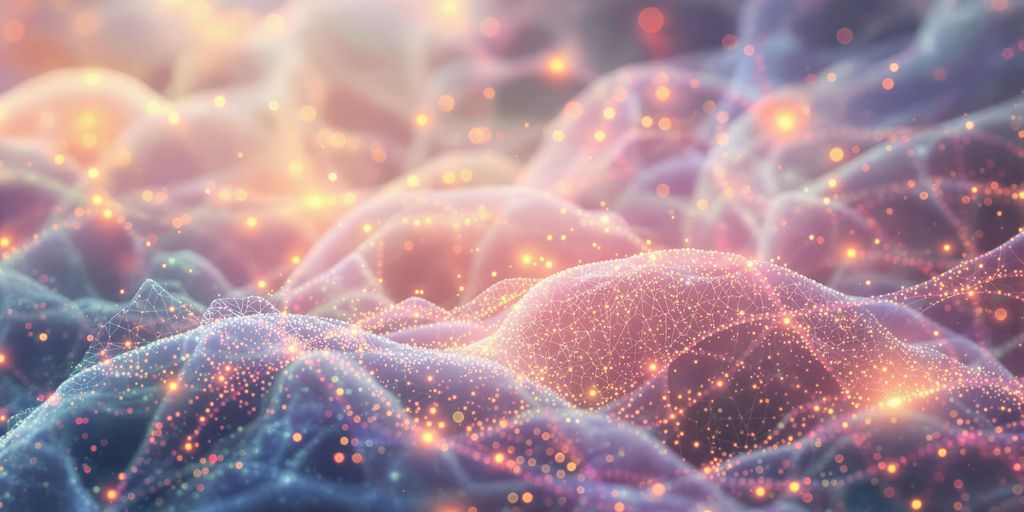Boost Cellular Regeneration: Discover Peptide Support Benefits
Enhance your health with cellular regeneration! Discover how peptides boost cell repair, vitality, and wellness. Learn more about their benefits today.


Have you ever wondered how your body keeps itself in tip-top shape? It's all about something called cellular regeneration. This is a natural process where your body fixes and replaces old or damaged cells. It's super important for keeping you healthy and feeling good. But what if you could give this process a little boost? Turns out, tiny things called peptides might be able to help. They're like little messengers that tell your cells what to do. Let's look at how these peptides can help your body's cellular regeneration and what that means for you.
Key Takeaways
- Cellular regeneration is your body's way of fixing and replacing cells, and it's key for staying healthy.
- Peptides act like messengers, guiding your cells to do important jobs like cleaning up and making new energy.
- Certain peptides, like VIP, BPC-157, and TB4, have specific jobs that help your cells work better.
- Using peptides might help your brain, reduce swelling, and give you more energy.
- Always talk to a doctor or someone who knows about peptides before you start using them, and make sure you get them from a good source.
Understanding Cellular Regeneration
What Is Cellular Regeneration?
Cellular regeneration is basically your body's way of fixing and renewing itself. Think of it like this: when you get a cut, your skin cells work to close the wound. That's regeneration in action. It's the process where old or damaged cells are replaced with new, healthy ones. Cellular regeneration keeps your tissues and organs in good working order. It's happening all the time, but sometimes it needs a little boost.
Why Cellular Regeneration Matters for Health
Why should you care about cellular regeneration? Well, it's pretty important for staying healthy and feeling good. When your cells regenerate efficiently, you're better able to:
- Heal from injuries faster.
- Maintain healthy organ function.
- Keep your skin looking young.
- Fight off diseases more effectively.
As we age, our ability to regenerate cells slows down. This can lead to things like wrinkles, slower healing, and increased risk of illness. That's why supporting cellular regeneration is key for healthy aging.
The Role of Peptides in Cellular Health
Peptides are like little messengers in your body. They tell your cells what to do. In the context of cellular regeneration, peptides can:
- Signal cells to repair damage.
- Promote the growth of new cells.
- Reduce inflammation that can hinder regeneration.
- Support the production of important molecules like NAD, which is vital for cellular energy and repair.
Think of peptides as the construction crew that helps rebuild and maintain your body's cellular infrastructure. They're a natural way to give your cells the support they need to stay healthy and regenerate effectively.
How Peptides Support Your Cells
Peptides are like tiny messengers in your body, helping cells talk to each other and do their jobs better. They play a big part in keeping you healthy. Let's look at how they work.
Peptides as Signaling Molecules
Think of peptides as the internet for your cells. They carry signals that tell cells what to do. These signals can tell cells to grow, repair themselves, or even get rid of waste. Without these signals, your cells wouldn't know what to do, and your body wouldn't work as well. Peptides help with:
- Cell growth
- Tissue repair
- Immune function
Boosting NAD Levels for Cellular Renewal
NAD is a molecule that's super important for energy production and keeping your cells healthy. As you get older, your NAD levels go down, which can lead to problems. Peptides can help boost your NAD levels, which helps your cells work better and stay younger for longer. Some ways to boost NAD levels include:
- Exercise
- Taking NAD supplements
- Getting NAD infusions
Maintaining good NAD levels is important because as NAD levels decline with age, toxic proteins accumulate leading to cellular degeneration which is the root of all age related disease.
Peptides and Autophagy: Cellular Cleanup
Autophagy is like your cells' cleaning service. It gets rid of damaged parts and waste. Peptides can help start autophagy, which keeps your cells clean and working well. This is important because when cells can't clean themselves, problems can start. Autophagy helps with:
- Removing damaged cell parts
- Recycling cell materials
- Keeping cells healthy
Key Peptides for Cellular Regeneration
Alright, let's talk about some specific peptides that can really help with cellular regeneration. It's not just a general concept; there are particular ones that stand out. Think of them as specialized tools in your body's repair kit.
VIP, BPC-157, and TB4: What They Do
These three are like the superheroes of peptide support. VIP (Vasoactive Intestinal Peptide) is great for reducing inflammation and supporting your immune system. It can also help with brain function. BPC-157 (Body Protection Compound-157) is known for its healing abilities, especially in the gut and for injuries. TB4 (Thymosin Beta 4) is another powerful healer, aiding in tissue repair and reducing scarring. They each have unique roles, but all contribute to helping your body fix itself.
GLP-1 Peptides and Metabolic Health
You might have heard of GLP-1 peptides in the context of weight loss, and that's definitely part of the story. GLP-1 (Glucagon-Like Peptide-1) helps regulate blood sugar and can reduce hunger. But it's not just about weight. These peptides also play a role in supporting heart health and can improve your overall metabolic function. They're like a tune-up for your metabolism, helping everything run more smoothly.
Choosing the Right Peptides for Your Needs
Picking the right peptides isn't a one-size-fits-all thing. What works for your friend might not be the best for you. It really depends on what you're trying to achieve. Are you focused on healing an injury? Boosting your brainpower? Improving your metabolism? Here's a quick guide:
- For Injury Repair: BPC-157 and TB4 are good choices.
- For Immune Support: VIP can be helpful.
- For Metabolic Health: GLP-1 peptides might be worth considering.
It's always a good idea to talk to a healthcare provider who knows about peptides. They can help you figure out which ones are most likely to give you the results you're looking for, and they can make sure you're using them safely.
And remember, peptides are just one piece of the puzzle. They work best when combined with a healthy lifestyle, including a good diet, regular exercise, and enough sleep. Think of them as a boost to your body's natural ability to heal and regenerate.
Benefits of Peptide Support for Your Body
Improved Brain Function and Clarity
Ever feel like your brain is in a fog? Peptides might help clear things up. Some peptides can support better communication between brain cells. This can lead to improvements in memory, focus, and overall mental clarity. It's like giving your brain a tune-up, helping it run more smoothly. Think of it as less brain fog and more "aha!" moments throughout your day.
Reducing Inflammation and Supporting Healing
Inflammation is often at the root of many health problems. Peptides can play a role in reducing inflammation throughout your body. This can lead to faster healing from injuries, reduced joint pain, and an overall feeling of well-being. It's like having a built-in repair crew that's always on call.
When your body is less inflamed, it can focus on healing and repairing itself. This can lead to a noticeable improvement in your overall health and vitality.
Enhancing Energy and Vitality
Feeling tired all the time? Peptides might be able to help. By supporting cellular function and reducing inflammation, peptides can help boost your energy levels. This isn't just a quick fix; it's about supporting your body's natural ability to produce energy. You might find yourself feeling more motivated, active, and ready to take on the day.
Here's a simple breakdown of how peptides can impact your energy:
- Improved sleep quality
- Better nutrient absorption
- Enhanced cellular energy production
Integrating Peptides into Your Wellness Plan
So, you're thinking about adding peptides to your routine? That's cool. It's not like flipping a switch, though. It's more like adding a new ingredient to your favorite recipe. Here's how to do it right.
Working with a Knowledgeable Provider
First things first: don't go it alone. Find a doctor or healthcare provider who actually knows their stuff about peptides. I mean, really knows. They should be able to explain what peptides might be good for you, based on your health and goals. They can also help you figure out the right dose and how to take them safely. It's like having a guide in a new city – you don't want to get lost.
Combining Peptides with Lifestyle Choices
Peptides aren't magic. They work best when you're already doing other healthy things. Think of it like this:
- Eating a balanced diet: Fuel your body with good stuff.
- Getting enough sleep: Let your body repair itself.
- Managing stress: Keep your mind calm.
- Exercising regularly: Move your body!
It's all connected. Peptides can help, but they're not going to undo years of bad habits. You need to put in the work too. Think of peptides as a boost, not a replacement, for a healthy lifestyle.
Monitoring Your Progress and Adjusting
Pay attention to how you feel. Are you noticing any changes? Good or bad? Keep a journal or use an app to track your progress. This will help you and your provider see what's working and what's not. Maybe you need a different dose, or a different peptide altogether. It's all about finding what works best for you. Don't expect instant results, and don't be afraid to tweak things along the way. It's a journey, not a race.
Addressing Common Concerns About Peptides
Peptides are getting a lot of attention, and it's normal to have questions. Let's tackle some common worries to help you feel more comfortable.
Are Peptides Safe and Effective?
This is probably the first thing on your mind. Generally, peptides are considered safe when used correctly. They're made of amino acids, which are the building blocks of proteins your body already uses. However, like any supplement or treatment, there can be risks.
- Side effects: Some people might experience mild side effects like redness or irritation at the injection site. Others could have allergic reactions, though this is rare.
- Quality matters: The safety and effectiveness of peptides depend a lot on where you get them. Always choose a reputable source that does third-party testing to make sure you're getting what you pay for.
- Research is ongoing: While many peptides show promise, research is still happening. We're learning more all the time about how they work and what they can do.
Understanding Dosing and Administration
Getting the right dose and taking peptides the right way is super important. It's not a one-size-fits-all thing. What works for one person might not work for another.
- Start low, go slow: It's usually best to start with a low dose and gradually increase it as needed. This helps your body adjust and reduces the chance of side effects.
- Follow instructions: Pay close attention to the instructions that come with your peptides. Some are taken orally, others are injected, and some are applied topically. Each method has its own set of guidelines.
- Consistency is key: Peptides often work best when taken consistently over time. Don't expect instant results. It can take weeks or even months to see a difference.
What to Avoid When Using Peptides
To make sure you're using peptides safely and effectively, here are a few things to avoid:
- Buying from unreliable sources: Steer clear of websites that don't have good reviews or don't provide information about their products. Quality control is key.
- Self-treating serious conditions: Peptides can be helpful, but they're not a replacement for medical care. If you have a serious health problem, see a doctor.
- Ignoring side effects: If you experience any unusual or concerning side effects, stop taking the peptides and talk to a healthcare provider.
It's important to remember that peptides are not magic bullets. They work best when combined with a healthy lifestyle, including a balanced diet, regular exercise, and good sleep. Think of them as one piece of the puzzle, not the whole picture.
Got questions about peptides? We're here to clear things up. Many people wonder about how peptides work, if they're safe, and what benefits they offer. We've put together easy-to-understand answers to all your main worries. To learn more and get all the facts, visit our website today!
Wrapping Things Up
So, you've learned a lot about peptides and how they can help your body fix itself. It's pretty cool how these tiny things can make such a big difference, right? Remember, your body is always working to keep you healthy, and sometimes it just needs a little extra help. Peptides might be that help. If you're thinking about trying them, talk to a doctor first. They can help you figure out what's best for you. Taking care of yourself is a journey, and knowing about things like peptides can be a good step on that path.
Frequently Asked Questions
What exactly is cellular regeneration?
Think of cellular regeneration as your body's way of constantly fixing itself. It's the process where old, worn-out cells are replaced with new, healthy ones. This is super important because it keeps all your body parts working well, from your skin to your brain.
How do peptides actually work?
Peptides are like tiny messengers in your body. They are small chains of amino acids, which are the building blocks of proteins. These messengers tell your cells what to do, helping them to grow, repair, and do their jobs correctly.
Are peptides truly effective for improving health?
Yes, many people find peptides helpful for various health goals. They can assist with things like healing injuries, reducing swelling, boosting energy, and even improving how your brain works. However, it's always best to talk to a doctor or a health expert before you start using them.
How do I choose the right peptide for me?
The right peptide for you depends on what you're trying to achieve. There are different types, like VIP, BPC-157, and GLP-1 peptides, each with unique roles. A healthcare provider can help you figure out which one might be best for your specific needs.
How are peptides typically used or given?
Peptides are usually given as shots, but some can be taken as pills, nasal sprays or creams. The amount you need and how often you take it will depend on the peptide and your health goals. It's crucial to follow your provider's instructions carefully.
Are there any side effects or risks when using peptides?
While peptides are generally considered safe when used correctly, some people might experience mild side effects like redness at the injection site or stomach upset. It's important to get your peptides from a trusted source and to always use them under the guidance of a healthcare professional.
Ready to feel like you again?
* Your next step toward feeling better starts today. At The Dearing Clinic we make it simple to get started with care that truly fits your life. Book your visit now and let’s design a plan that restores your energy, relieves your pain, and helps you enjoy more of what matters most.


